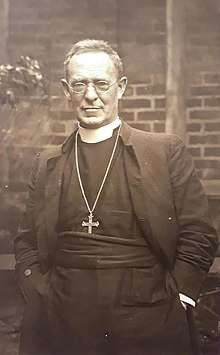George Cranswick
George Harvard Cranswick (1882–1954) was the 2nd Bishop of Gippsland from 1917 until 1942.[1]

Rt Rev George Cranswick, Bishop of Gippsland
Educated at The King's School, Parramatta, and Sydney University,[2] he was ordained in 1908.[3] In a varied career he was acting vice-principal of Noble College, Masulipatam, headmaster of the CMS Bezwada, chairman of the Deccan District Church Council and rector of St Paul's, Chatswood[4] before his elevation to the Episcopate. His younger brother, Geoffrey, was the 8th Bishop of Tasmania.[5] An eminent author,[6] he died on 25 October 1954.[7]
Notes
- Australian Newspapers Archive
- ADB on line
- Ranked Australian Electoral Rolls, 1901-1936
- Diocesan history Archived 13 September 2009 at the Wayback Machine - “Who was Who” 1897-2007 London, A & C Black, 2007 ISBN 978-0-19-954087-7
- Matriculation details - "The Clergy List" London, Kelly’s, 1913
- Church web site
- National Church Institutions Database of Manuscripts and Archives
- Among others he wrote The Call of India (1908), Roman Catholic Evasions (1919), The Australian Church (1923) and A New Deal for Papua (1949). See G H Cranswick at National Library of Australia.
- "Obituary Bishop Cranswick", The Times, 26 October 1954, pg. 10, issue 53072; col D
| Church of England titles | ||
|---|---|---|
| Preceded by Arthur Wellesley Pain |
Bishop of Gippsland 1917 –1942 |
Succeeded by Donald Burns Blackwood |
gollark: He is, in fact, on this server sometimes.
gollark: There is still travel time. Your scheme just involves pretending there isn't in a convoluted way.
gollark: It doesn't not take time just because you fiddle with the clocks.
gollark: FTL is also apparently equivalent to time travel, which means that it would cause problemsl.
gollark: You just observe one particle being in some random state, and know that the other has to be in the opposite one.
This article is issued from Wikipedia. The text is licensed under Creative Commons - Attribution - Sharealike. Additional terms may apply for the media files.